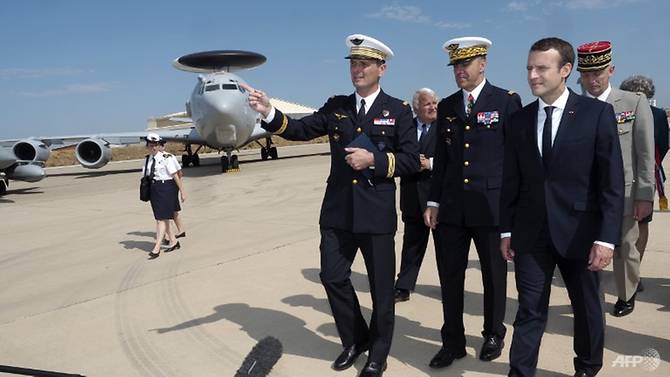Macron seeks to repair damage after army chief quit
 |
| French President Emmanuel Macron (R) visits the BA 125 French Air Force base in Istres on Jul 20, 2017. (Photo: Arnold Jerocki/Pool/AFP) |
Macron flew to the base in Istres, southern France, a day after General Pierre de Villiers quit in the wake of a row over the government's plans to slash €850 million (US$980 million) from his budget.
De Villiers stepped aside after being publicly slapped down by Macron in front of the troops for telling a parliamentary committee he would not allow the armed forces to be "screwed".
The 39-year-old president's handling of the dispute with the 60-year-old general was widely criticised by his opponents and the press as heavy-handed.
Macron, who last week told the armed forces "I am your boss", stood his ground after de Villiers' departure, saying "it is not the job of the head of the armed forces" to question the budget.
The president also stood by his pledge to raise the defence budget again in 2018, saying: "I'm behind our troops."
In a sign of his popularity with the rank and file, staff at the defence ministry gave de Villiers a rousing sendoff as he left for the last time on Wednesday, forming a guard of honour amid rapturous applause.
The video of his departure was posted on the official Twitter account of the chiefs of staff with the message: "Thank you".
In his resignation statement, the general said he had no choice but to step aside in the face of the planned cuts.
"I no longer feel able to ensure the sustainability of the model of the armed forces that I think is necessary to guarantee the protection of France and the French people," he said.
General Francois Lecointre, a 55-year-old hero of the wars in the Balkans, was named as de Villiers's replacement. He accompanied Macron to the airbase on Thursday.
'SHOT SELF IN FOOT'
The French press held Macron chiefly responsible for the dispute, which many commentators saw as the first misstep of his two-month-old presidency.
The conservative Le Figaro daily accused the president of "shooting himself in the foot" in behaving "like a little departmental head who is obliged to remind everyone who's boss".
The leftist Liberation newspaper said Macron's "little authoritarian fit" could be a sign he was drunk on power and said he was time for the youthful leader "to grow up a bit".
Macron's defence cuts - part of a €4.5-billion reduction in spending aimed at reducing France's budget deficit - were viewed by the military as a betrayal after his strong show of support for the armed forces during his first weeks in office.
ACTION MAN
Macron's first foreign trip was to Mali, where he meet French troops engaged in counter-terrorism operations.
Earlier this month, he was photographed being winched action man-style onto a nuclear submarine from a helicopter.
The president's office said he would use the speech at the air base to "reiterate his support for the armed forces, reminding them of his campaign pledge to increase the defence budget as well as his ambitious plans for them in a difficult international environment".
Seen as one of the finest officers of his generation, de Villiers's departure triggered howls of indignation from the opposition.
Retired general Dominique Trinquand, who advised Macron during his election campaign, said the row had cast a pall over his otherwise "remarkable" debut. "This is a hitch that will probably be a bit difficult to get past," he told AFP.
Nuclear-armed France and Britain are the biggest military powers in the European Union.
French forces are currently taking part in strikes against Islamic State militants in Syria and Iraq and 4,000 French soldiers are involved in counter-terrorism efforts in west and central Africa.
And at home, 7,000 soldiers are deployed to patrol the streets after a series of terror attacks that have killed more than 230 people since 2015.
What the stars mean:
★ Poor ★ ★ Promising ★★★ Good ★★★★ Very good ★★★★★ Exceptional
Latest News
More News
- Russian President congratulates Vietnamese Party leader during phone talks (January 25, 2026 | 09:58)
- Worldwide congratulations underscore confidence in Vietnam’s 14th Party Congress (January 23, 2026 | 09:02)
- Political parties, organisations, int’l friends send congratulations to 14th National Party Congress (January 22, 2026 | 09:33)
- 14th National Party Congress: Japanese media highlight Vietnam’s growth targets (January 21, 2026 | 09:46)
- 14th National Party Congress: Driving force for Vietnam to continue renewal, innovation, breakthroughs (January 21, 2026 | 09:42)
- Vietnam remains spiritual support for progressive forces: Colombian party leader (January 21, 2026 | 08:00)
- Int'l media provides large coverage of 14th National Party Congress's first working day (January 20, 2026 | 09:09)
- Vietnamese firms win top honours at ASEAN Digital Awards (January 16, 2026 | 16:45)
- ASEAN Digital Ministers' Meeting opens in Hanoi (January 15, 2026 | 15:33)
- ASEAN economies move up the global chip value chain (December 09, 2025 | 13:32)
















 Mobile Version
Mobile Version